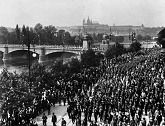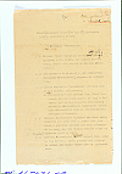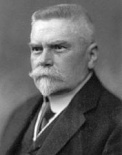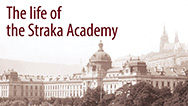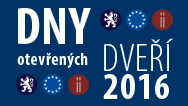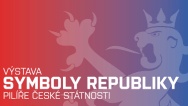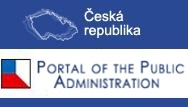Important days
11. 11. 2011
The first meeting of the Revolutionary National Assembly and the election of T.G. Masaryk as President of the Republic
Conditions for the establishment of the legislative institution of the future Czechoslovak state began to develop as early as the summer of 1918 with the so-called National Czechoslovak Committee. In short it was a political body of 38 members, founded for the purpose of preparing positions for the transfer of power from the hands of the existing imperial structures. Its narrow leadership was made up of Karel Kramář as President, Alois Švehla and Jaroslav Vaclav Klofáč as Vice-Presidents, and František Soukup as Executive. After the proclamation of the independent Czechoslovak state on the 28th of October 1918, the National Committee undertook to exercise legislative and even executive powers for as long as necessary. This meant mainly the period up to the creation and adoption of a new constitution that would definitively affirm Czechoslovak statehood. The interim constitution was drawn up by the National Committee on the 5th of November and by the 13th of November its concept was published with only 21 paragraphs, which proclaimed the fundamental principle of a democratic state - the division of powers.
The focal point of the meeting was the election of President, the Prime Minister and the Chairman and Vice-Chairmen of the National Assembly. The meeting opened with Karel Kramář’s acceptance speech, where in addition to key figures in the creation of the Czechoslovak state - Masaryk, Beneš, Štefánik, “the men of the 28th of October”, and others – he did not fail to emphasize the role of the Czechoslovak Legionnaires, the states of the Agreement and all its allies and, ultimately, even the ordinary people Czechoslovakia. In a later part of his speech, Kramář said two more important things, namely that the Habsburg-Lorraine dynasty has lost any right it had to the Czech throne and that the Czechoslovak state accepts the establishment of a Republic. After the introductory speech was the election of the first President of the National Assembly, which became the Social Democratic politician František Tomášek, who also immediately took control of the meeting.
The whole meeting was marked by a very enthusiastic and festive atmosphere. Most of the points discussed were adopted unanimously and the election of the president and the government became a mere formality. Tomáš Garrigue Masaryk was unanimously elected in absentia as the President of the Republic for a two-year term. There was no talk of another candidate. Masaryk was in essence already elected at the Geneva negotiations between representatives of the National Committee and the exiled political representatives between the 28th and 31st of October 1918, and in Kramář’s previously-mentioned initial acceptance speech Masaryk’s name was mentioned with the epithet of the first president of the Czechoslovak Republic.
The election of the government was also not too complicated. Its seventeen-member composition to the National Assembly was proposed by deputies Dr. Bela, Dr. Šámal, Udržal, Slavíček, Stivín and Dr. Šrámek. The government headed by Prime Minister Karel Kramář was subsequently approved by acclamation also without objection. The most powerful position in the government was given to the Republican Party with four key ministries including the Ministry of the Interior. For the complete composition of the government see the link. In addition to the necessary organizational matters, the conclusion of the meeting decided upon the establishment of an institutional, financial and socio-political commission; however, without naming the individual members. The actual legislative activity during this first meeting was limited to a first reading of a draft law introducing the eight-hour working time, a replacement means of payment and the abolition of the nobility, titles and orders.
The Revolutionary National Assembly with its broad powers existed until the new so-called “February constitution” was approved on the 29th of February 1920. The formation of the final form of the Czechoslovak constitution was its primary objective. During this period it contributed to the gradual establishment of Czechoslovakia on the world map and an avoidance of chaotic tendencies that could have occurred due to the formation of the new state. The first direct elections to the National Assembly took place on the 18th of April 1920 and started the truly genuine parliamentary democracy of Czechoslovakia, which lasted until the turbulent times of the dawn of the Second World War.
Author of the text: Tomáš Trávník
